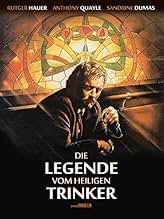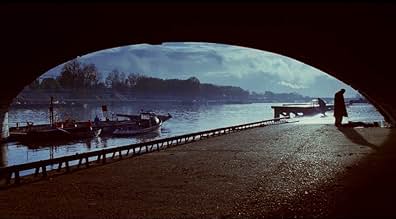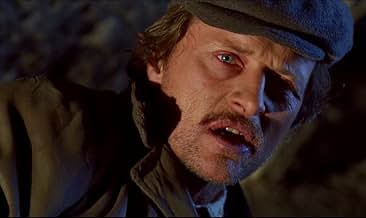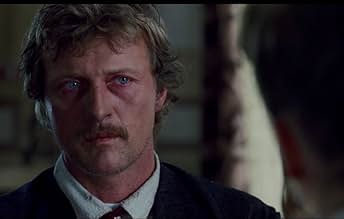VALUTAZIONE IMDb
7,1/10
2369
LA TUA VALUTAZIONE
Un senzatetto alcolizzato riceve duecento franchi da uno sconosciuto che gli chiede di restituire il denaro a Santa Teresa nella cattedrale quando sarà in grado di farlo.Un senzatetto alcolizzato riceve duecento franchi da uno sconosciuto che gli chiede di restituire il denaro a Santa Teresa nella cattedrale quando sarà in grado di farlo.Un senzatetto alcolizzato riceve duecento franchi da uno sconosciuto che gli chiede di restituire il denaro a Santa Teresa nella cattedrale quando sarà in grado di farlo.
- Regia
- Sceneggiatura
- Star
- Premi
- 12 vittorie e 3 candidature totali
Francesco Aldighieri
- Policeman
- (as Franco Aldighieri)
Recensioni in evidenza
Takeaway Scene
Rutger Hauer's biggest, joyful smile is for a bathtub.
The Good This is one of very few successful screen transpositions of an introspective literary work. The dialogue is sparse and in two languages but the film while making small adjustments here and there conveys all the internal monologue of Joseph roth's novella. Hauer. Probably his best performance (although I also like his understated character in lady Hawke). He is the icon of a getleman drunk. The photography. natural, unobtrusive, realistic. The cast: A very heterogeneous looking cast that manages to fit in well and act natural in their respective roles. The women: For a very Catholic director, Olmi is very kind to almost the women in the movie, including extras, and they look attractive without losing their real, unpolished authenticit
The Not So Good The film is almost real time,with long contemplative moments, to the point that sometimes the flashbacks have more action that the main scene. For all its photographical and acting beauty, the going can be slow, and watching Hauer drinking one longs to join in. I haven't counted them, but I suspect that matching the movie glass for glass would be lethal (especially the Cafe'-Calva followed by an Absinthe in the morning)
The Strange Hauer is a character living and dressing in the 1930s filmed in 1980s Paris. And it fits seamlessly, the same way that the real, surviving old bistrots and locations fit in their modern surroundings. Olmi has taken advantage of a phenomenon familiar to us all walking in cities and performed a sleight of hand trick, aided by the costume design of Ms. Marchand that emphasizes the continuity between periods to blend characters in.
The Good This is one of very few successful screen transpositions of an introspective literary work. The dialogue is sparse and in two languages but the film while making small adjustments here and there conveys all the internal monologue of Joseph roth's novella. Hauer. Probably his best performance (although I also like his understated character in lady Hawke). He is the icon of a getleman drunk. The photography. natural, unobtrusive, realistic. The cast: A very heterogeneous looking cast that manages to fit in well and act natural in their respective roles. The women: For a very Catholic director, Olmi is very kind to almost the women in the movie, including extras, and they look attractive without losing their real, unpolished authenticit
The Not So Good The film is almost real time,with long contemplative moments, to the point that sometimes the flashbacks have more action that the main scene. For all its photographical and acting beauty, the going can be slow, and watching Hauer drinking one longs to join in. I haven't counted them, but I suspect that matching the movie glass for glass would be lethal (especially the Cafe'-Calva followed by an Absinthe in the morning)
The Strange Hauer is a character living and dressing in the 1930s filmed in 1980s Paris. And it fits seamlessly, the same way that the real, surviving old bistrots and locations fit in their modern surroundings. Olmi has taken advantage of a phenomenon familiar to us all walking in cities and performed a sleight of hand trick, aided by the costume design of Ms. Marchand that emphasizes the continuity between periods to blend characters in.
This tale of a tramp who is the recipient of the milk of human kindness but who finds it difficult to repay the goodness shown to him is typical of its director, Ermanno Olmi, but whereas other Olmi films deal with the common-place with an uncommon beauty this tale of the mystical is overtly simplistic. "The Legend of the Holy Drinker" is visually superb and we should expect nothing less from an Olmi picture but it is also very dry, very dull and very unevenly acted, (the partial dubbing of its international cast certainly doesn't help).
As the tramp Rutger Hauer staggers around looking a little too bewildered at what's happening to him and the supporting cast are fundamentally just bit players in his far from interesting story. The Stravinsky score also sits somewhat uneasily on proceedings. Some people think this is a masterpiece while others have simply dismissed it. Personally I found it a crashing bore.
As the tramp Rutger Hauer staggers around looking a little too bewildered at what's happening to him and the supporting cast are fundamentally just bit players in his far from interesting story. The Stravinsky score also sits somewhat uneasily on proceedings. Some people think this is a masterpiece while others have simply dismissed it. Personally I found it a crashing bore.
Olmi is one of Europe's last Old Masters in the art of film making. He is usually regarded as a belated neo-realist, but after you've seen "The Legend of the Holy Drinker", you will realize the label simply does not stick. This is a film about spirituality, about communion, one of the most deeply religious movies ever, whose only rivals might be Dreyer's "Ordet" or Bergman's rather pretentious "faith trilogy" ("Through a Glass Darkly", "Winter Light" and "The Silence"). However, you will not find Scandinavian mists or angst in Catholic Olmi's adaptation of the beautiful novella written, oddly enough, by a great Jewish novelist, Joseph Roth. Wine is a metaphor for life, and Paris is a metaphor for our urban world. In this symbolic universe, it takes a great actor to give flesh and blood to the character of Andreas, the holy drinker, a beggar endowed with an amazing sense of dignity. Rutger Hauer was the man for the job: this was his best performance: he was never better, and, to judge from the course his career has taken, I fear he will never be better than in this film. It is not a thriller, but it is thrilling. It takes its own leisurely pace, but goes very far, very deep indeed into the human soul. After so many insipid or unpalatable cinematic concoctions, treat yourself to this film: it truly is vintage stuff.
A drunken homeless man (Rutger Hauer) in Paris is lent 200 francs by a stranger (Anthony Quayle) as long as he promises to repay it to a local church when he can afford to; the film depicts the man's constant frustrations as he attempts to do so.
This project started when producer Roberto Cicutto (Hotel Rwanda) bought the rights to Roth's book of the same name. A few directors were approached and turned the film down because the plot was too "thin" and "vague". Finally, Ermanno Olmi (Tree of Wooden Clogs) was suggested by Tullio Kezich's wife, and he accepted. Perhaps because of modesty, Kezich suggests that Olmi wrote the bulk of the script, with Kezich merely "watching him work". Kezich is best known as the film critic for Corriere della Sera and for his award-winning biography of director Federico Fellini.
According to Kezich, Robert DeNiro wanted the lead role, and Cicutto flew him to Europe to meet with Olmi. DeNiro was in awe of Olmi, but apparently the feeling was not mutual. Oddly, Rutger Hauer was wanted by Olmi because of his role in "The Hitcher" (1986), which makes little sense. Hauer himself concedes that he was more comfortable with action, and less comfortable with nuance.
In fact, Hauer was probably a better choice than DeNiro, despite the latter's bigger star power. Hauer is quite effective as the alcoholic, not overdoing it. The way he is dressed and presents himself makes the "holy drinker" an interesting character because on the surface he appears quite well-to-do when, in fact, he sleeps under a bridge.
Worth noting is Anthony Quayle, who has a small but important part, as he really commands attention from the audience just with his presence. Unlike Hauer, Quayle was primarily a stage actor, steeped in Broadway and Shakespeare. This may be why he so naturally comes off as "distinguished" because he certainly was.
The film won the Golden Lion at the 45th edition of the Venice Film Festival. It also won four David di Donatello Awards (for best film, best director, Best cinematography and best editing) and two Silver Ribbons (for best director and best screenplay). The film was selected as the Italian entry for the Best Foreign Language Film at the 61st Academy Awards, though it was not accepted as a nominee.
This mysterious tale -- almost a dark, dry comedy -- really comes to life on the Arrow Blu-ray. The special features are fairly slim, though the 25-minute interview with Kezich is enlightening and the 10-minute interview with Hauer is a joy. The best thing about this film is that it is now going to be available to a new audience. Though not well-known, it ought to be. In this reviewer's humble opinion, "Holy Drinker" is superior to "Tree of Wooden Clogs", and may be Hauer's finest role.
This project started when producer Roberto Cicutto (Hotel Rwanda) bought the rights to Roth's book of the same name. A few directors were approached and turned the film down because the plot was too "thin" and "vague". Finally, Ermanno Olmi (Tree of Wooden Clogs) was suggested by Tullio Kezich's wife, and he accepted. Perhaps because of modesty, Kezich suggests that Olmi wrote the bulk of the script, with Kezich merely "watching him work". Kezich is best known as the film critic for Corriere della Sera and for his award-winning biography of director Federico Fellini.
According to Kezich, Robert DeNiro wanted the lead role, and Cicutto flew him to Europe to meet with Olmi. DeNiro was in awe of Olmi, but apparently the feeling was not mutual. Oddly, Rutger Hauer was wanted by Olmi because of his role in "The Hitcher" (1986), which makes little sense. Hauer himself concedes that he was more comfortable with action, and less comfortable with nuance.
In fact, Hauer was probably a better choice than DeNiro, despite the latter's bigger star power. Hauer is quite effective as the alcoholic, not overdoing it. The way he is dressed and presents himself makes the "holy drinker" an interesting character because on the surface he appears quite well-to-do when, in fact, he sleeps under a bridge.
Worth noting is Anthony Quayle, who has a small but important part, as he really commands attention from the audience just with his presence. Unlike Hauer, Quayle was primarily a stage actor, steeped in Broadway and Shakespeare. This may be why he so naturally comes off as "distinguished" because he certainly was.
The film won the Golden Lion at the 45th edition of the Venice Film Festival. It also won four David di Donatello Awards (for best film, best director, Best cinematography and best editing) and two Silver Ribbons (for best director and best screenplay). The film was selected as the Italian entry for the Best Foreign Language Film at the 61st Academy Awards, though it was not accepted as a nominee.
This mysterious tale -- almost a dark, dry comedy -- really comes to life on the Arrow Blu-ray. The special features are fairly slim, though the 25-minute interview with Kezich is enlightening and the 10-minute interview with Hauer is a joy. The best thing about this film is that it is now going to be available to a new audience. Though not well-known, it ought to be. In this reviewer's humble opinion, "Holy Drinker" is superior to "Tree of Wooden Clogs", and may be Hauer's finest role.
This film embraces everything that contemporary Hollywood cinema is so afraid of - intelligence, moral complexity, and rich characterisation. It is a simple tale really - an alcoholic vagrant in Paris is lent 200 francs by a stranger, on condition that he repays it to a local chapel when he can afford it. But what makes this an extraordinary film is the manner in which we are drawn so completely into this seemingly trivial and futile quest. This is principally down to Rutger Hauer's towering performance as the haunted, suffering tramp, who has to battle both ill-fortune and his own past to repay the debt and find peace. There is little in the way of either dialogue or action, yet Ermanno Olmi's vision of a timeless, enchanted Paris is dazzling. A lesson to others in how to tell a story on film.
Lo sapevi?
- QuizRobert De Niro was approached for the role of Andreas Kartak, but he turned down the offer because he was not convinced about the project.
- Curiosità sui crediti"May God grant all of us, the drinkers, such a light and beautiful death". (Joseph Roth)
- ConnessioniFeatured in Het uur van de wolf: Rutger Hauer: Blond, blue eyes (2006)
I più visti
Accedi per valutare e creare un elenco di titoli salvati per ottenere consigli personalizzati
- How long is The Legend of the Holy Drinker?Powered by Alexa
Dettagli
- Data di uscita
- Paesi di origine
- Lingue
- Celebre anche come
- The Legend of the Holy Drinker
- Luoghi delle riprese
- Aziende produttrici
- Vedi altri crediti dell’azienda su IMDbPro
Botteghino
- Lordo in tutto il mondo
- 6384 USD
- Tempo di esecuzione
- 2h 8min(128 min)
- Colore
- Mix di suoni
- Proporzioni
- 1.85 : 1
Contribuisci a questa pagina
Suggerisci una modifica o aggiungi i contenuti mancanti























